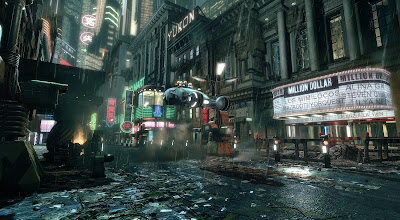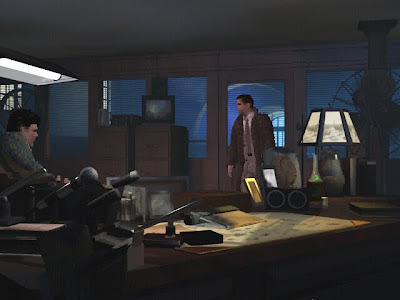BLADE RUNNER
Release Year: 1997
Original Console Release: PC (Microsoft Windows)
Developer: Westwood Studios
By Nick Murray, Videogames Contributor.
This year marks the 30th anniversary of Blade Runner, arguably one of the greatest and most influential Sci-Fi films of all time. So with that in mind, this fortnight’s Friday Flashback will focus on the cult PC classic of the same name.
Developed by Westwood Studios in 1997, Blade Runner is a fairly standard point-and-click adventure. Thrust into the role of Ray McCoy, you are charged with hunting down a volatile pack of replicants, using all the puzzle solving prowess you have. Occasional gun fights are thrown into the mix, but the general essence of this game is its adventuring, collecting items and talking to inhabitants to gather clues, very much like the Monkey Island games of old. Fans of the genre will feel right at home here, with puzzles ranging from mildly challenging to head scratchingly frustrating, but the same can be said of most games of this ilk and it’s nice to be reminded of a time when developers weren’t afraid to throw continual mental challenges at a player. There's really not a great deal different here in terms of core gameplay that makes it stand fundamentally stand out from the crowd when looking at the title in retrospect, with the notable exception of it's fantastic use and application of the source material.
Now everybody is already pretty aware that movie tie-in games are almost always fairly awful. They're almost always rushed, made with no love and are designed really just to chase a buck, another piece of cashable marketing as part of one big merchandise push for a major release. There are a few exceptions to the rule, but those exceptions are usually games that aren't made to coincide with a movie's release; Indiana Jones and the Fate of Atlantis, Ghostbusters The Video Game, and next year's Aliens: Colonial Marines spring to mind (Star Wars: Knights of the Old Republic? - Kyle). Blade Runner is firmly in this camp as it was made some 15 years after the movie's initial release, and like those other games, has it's own story that exists within the mythos and the universe that the film established. The game's story in fact runs parallel to the movie's, and you'll find yourself on many an occasion in familiar locations, talking to familiar characters. The setting delivers a greater service than just being a series of nods and winks, however. The best way to explain this would be with an example. Those of you familiar with the movie will know all about the Voight-Kampff test, the interrogation tool utilised by the Blade Runners to identify replicants. In the game you often have to get information to open up a new line of investigation, and thus progress. In other point-and-click adventures this is done by simply selecting the right sequence of questions of the character you're talking to. Moments like that exist in Blade Runner too, but often you'll find yourself hooking up the Voight-Kampff machine and genuinely nervous as to whether or not you're talking to a replicant. After all, who could say exactly how a rumbled replicant will react. Another example is taking security footage from a crime scene back to your apartment and reviewing the images over and over trying to find every possible clue, zooming in on anything that looks like it might be relevant. It doesn't sound like anything special, but missing a clue can alter the outcome of the game, and make your investigation all the more difficult. Westwood set out to put you in the role of a Blade Runner, and that is exactly what they did.
As mentioned, should you miss a clue, or let a certain character live or die, the outcome of the game can be effected or altered, with no less than 13 different endings to showcase this. This was no doubt inspired by the multiple endings and interpretations the many versions of the movie has, and the questions they raise (the key one being is Deckard, Harrison Ford’s main protagonist, a replicant?). The game raises the same questions, but unlike the movie, answers them less ambiguously. The 'is he or isn't he?' is only a small part of the endings however, depending on the decisions you made throughout the game, certain characters can may be there with you to discover all the answers, or they may have met an untimely demise. I've played through this game many times, and I've only had maybe 3 or 4 different endings, meaning I’m not trying to consciously do things very differently on each playthrough. For completists like myself, the game has very high replay value even to this day.
In short, this game is the ideal companion to the movie without being suffocated by its ties to it, and fortunately Westwood were able to craft a title that was able to be it’s own experience, and has ended up becoming a must-have for hardcore fans of both the film and genre. If you're not so fond of the universe, but a fan of point-and-click adventure games, you'll still find a competent and challenging game here. This is a game people often forget they owned, but when brought up they recall just how engrossing it was. To paraphrase a certain android, all these games get lost, like tears in the rain.
NEXT TIME: Nick finishes his Sci-Fi retro tour (for now) with a look at Super Empire Strikes Back on the SNES.
Live on Friday October 12th.
For more news, updates and exclusive content from (A)musings, be sure to 'like' our Facebook page and also follow us on Twitter!
(A)musings Website coming soon at www.amusings.co.uk






I freakin loved this game!!!!!
ReplyDelete